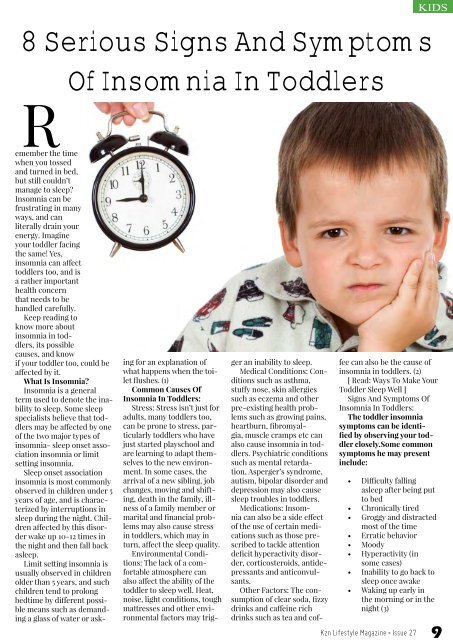You also want an ePaper? Increase the reach of your titles
YUMPU automatically turns print PDFs into web optimized ePapers that Google loves.
KIDS<br />
8 Serious Signs And Symptoms<br />
Of Insomnia In Toddlers<br />
R<br />
emember the time<br />
when you tossed<br />
and turned in bed,<br />
but still couldn’t<br />
manage to sleep?<br />
Insomnia can be<br />
frustrating in many<br />
ways, and can<br />
literally drain your<br />
energy. Imagine<br />
your toddler facing<br />
the same! Yes,<br />
insomnia can affect<br />
toddlers too, and is<br />
a rather important<br />
health concern<br />
that needs to be<br />
handled carefully.<br />
Keep reading to<br />
know more about<br />
insomnia in toddlers,<br />
its possible<br />
causes, and know<br />
if your toddler too, could be<br />
affected by it.<br />
What Is Insomnia?<br />
Insomnia is a general<br />
term used to denote the inability<br />
to sleep. Some sleep<br />
specialists believe that toddlers<br />
may be affected by one<br />
of the two major types of<br />
insomnia- sleep onset association<br />
insomnia or limit<br />
setting insomnia.<br />
Sleep onset association<br />
insomnia is most commonly<br />
observed in children under 5<br />
years of age, and is characterized<br />
by interruptions in<br />
sleep during the night. Children<br />
affected by this disorder<br />
wake up 10-12 times in<br />
the night and then fall back<br />
asleep.<br />
Limit setting insomnia is<br />
usually observed in children<br />
older than 5 years, and such<br />
children tend to prolong<br />
bedtime by different possible<br />
means such as demanding<br />
a glass of water or asking<br />
for an explanation of<br />
what happens when the toilet<br />
flushes. (1)<br />
Common Causes Of<br />
Insomnia In Toddlers:<br />
Stress: Stress isn’t just for<br />
adults, many toddlers too,<br />
can be prone to stress, particularly<br />
toddlers who have<br />
just started playschool and<br />
are learning to adapt themselves<br />
to the new environment.<br />
In some cases, the<br />
arrival of a new sibling, job<br />
changes, moving and shifting,<br />
death in the family, illness<br />
of a family member or<br />
marital and financial problems<br />
may also cause stress<br />
in toddlers, which may in<br />
turn, affect the sleep quality.<br />
Environmental Conditions:<br />
The lack of a comfortable<br />
atmosphere can<br />
also affect the ability of the<br />
toddler to sleep well. Heat,<br />
noise, light conditions, tough<br />
mattresses and other environmental<br />
factors may trigger<br />
an inability to sleep.<br />
Medical Conditions: Conditions<br />
such as asthma,<br />
stuffy nose, skin allergies<br />
such as eczema and other<br />
pre-existing health problems<br />
such as growing pains,<br />
heartburn, fibromyalgia,<br />
muscle cramps etc can<br />
also cause insomnia in toddlers.<br />
Psychiatric conditions<br />
such as mental retardation,<br />
Asperger’s syndrome,<br />
autism, bipolar disorder and<br />
depression may also cause<br />
sleep troubles in toddlers.<br />
Medications: Insomnia<br />
can also be a side effect<br />
of the use of certain medications<br />
such as those prescribed<br />
to tackle attention<br />
deficit hyperactivity disorder,<br />
corticosteroids, antidepressants<br />
and anticonvulsants.<br />
Other Factors: The consumption<br />
of clear soda, fizzy<br />
drinks and caffeine rich<br />
drinks such as tea and coffee<br />
can also be the cause of<br />
insomnia in toddlers. (2)<br />
[ Read: Ways To Make Your<br />
Toddler Sleep Well ]<br />
Signs And Symptoms Of<br />
Insomnia In Toddlers:<br />
The toddler insomnia<br />
symptoms can be identified<br />
by observing your toddler<br />
closely.Some common<br />
symptoms he may present<br />
include:<br />
• Difficulty falling<br />
asleep after being put<br />
to bed<br />
• Chronically tired<br />
• Groggy and distracted<br />
most of the time<br />
• Erratic behavior<br />
• Moody<br />
• Hyperactivity (in<br />
some cases)<br />
• Inability to go back to<br />
sleep once awake<br />
• Waking up early in<br />
the morning or in the<br />
night (3)<br />
Kzn Lifestyle Magazine • Issue 27<br />
9

















